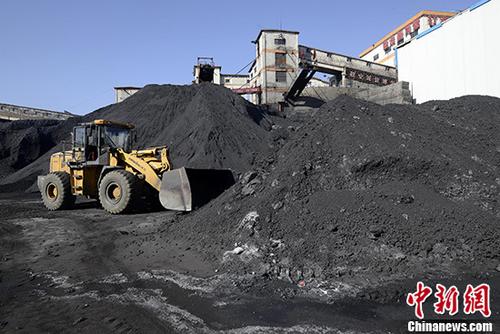Chinanews.com, September 11, Zhao Yingmin, deputy minister of the Ministry of Ecology and Environment, pointed out on the 11th that the “scattered and polluted” enterprises in key areas have basically completed the remediation, and the ultra-low emission transformation of the steel industry is currently progressing in an orderly manner. Coal burning in urban built-up areas Boilers have been basically eliminated, coal-fired power plants have basically completed ultra-low emission transformation, Beijing-Tianjin-Hebei and surrounding areas and the Fenwei Plain have completed more than 18 million rural scattered coal treatments.
Data map: a mine.
Photo by China News Agency reporter Wei Liang
The Information Office of the State Council held a regular policy briefing by the State Council on September 11, introducing the status of science and technology in helping to win the blue sky defense war.
What is the difference between this year’s autumn and winter air pollution campaign and previous years?
In this regard, Zhao Yingmin introduced that the response to severely polluted weather in autumn and winter is the focus of air pollution prevention and control. "More than 90% of the heavily polluted days in key areas are concentrated in autumn and winter, which is a heart and lung problem for the people. Therefore, air pollution in autumn and winter Prevention and control work is the top priority of the work throughout the year. It is also the discovery of key research projects, and targeted measures have been taken, especially the continuous improvement of the scientificity and accuracy of severely polluted weather emergency. In recent years, regional severely polluted weather has responded to Great changes have taken place in capabilities, levels, and effects, and the results are still very obvious."
First, the air quality has improved significantly.
Zhao Yingmin pointed out that after three years of hard work, the average concentration of PM2.5 in the autumn and winter in the Beijing-Tianjin-Hebei region and surrounding areas has dropped from 104 μg/m3 to 70 μg/m3, a cumulative drop of 32.7%, and the average heavy pollution day has increased from 37.4 days. It was down to 14.1 days, a decrease of 62%, and the rate of decrease was very large.
Second, various key tasks are progressing smoothly, "because the improvement of environmental quality is followed by a large number of solid and specific environmental governance projects and tasks."
Zhao Yingmin said that the “scattered and polluted” enterprises in key areas have basically completed the remediation, the ultra-low emission transformation of the steel industry is currently being carried out in an orderly manner, the coal-fired boilers in urban built-up areas have been basically eliminated, and coal-fired power plants have basically completed ultra-low emissions. Emissions transformation, Beijing-Tianjin-Hebei and surrounding areas, as well as the Fenwei Plain, completed more than 18 million rural scattered coal treatments.
Significant progress has been made in the transfer of railways to railways. The freight volume of Beijing-Tianjin-Hebei Railway increased by 26.2% year-on-year last year.
At the same time, vigorously promote new energy vehicles. From 2015 to 2019, the number of new energy buses in China's cities has increased from 116,300 to 409,700. "The proportion of buses has increased from 20.7% to 59.1%, and the number of new energy buses has already accounted for the global First, the annual fuel savings exceeds 1.6 million tons, and the environmental benefits are still very large."
Third, respond to heavy pollution weather more accurately, strengthen regional joint prevention and control, improve key regional emergency response mechanisms, establish a fast and effective operation mode, and ensure the activation of regional emergency response to enable relevant cities to respond in time and respond effectively.
"We aimed at precise scientific prevention and control, and based on one of the results of key research projects, we carried out precise performance grading for 39 key industries. Simply put, we divided the companies in 39 industries into A, B, and B according to their environmental performance. In the third gear of C, category A companies can reduce or not reduce emissions in the case of heavy pollution; category B is to carry out corresponding emission reductions as required; category C may require more emission reductions. Through differentiated management Encouraging "advanced" and spurring "backwardness" means that environmental management has been used to promote industrial upgrading, technological progress, and high-quality development. It should be said that the effect is still very obvious, and it has also been welcomed by enterprises." Zhao Yingmin said.
Zhao Yingmin pointed out that this year is the last autumn and winter of the "13th Five-Year Plan" and the last autumn and winter of the "Three-Year Action Plan for Winning the Blue Sky War". It is also facing the situation of normalization of epidemic prevention and control. According to the deployment, the Ministry of Ecology and Environment will coordinate the key tasks of epidemic prevention and control, stable and healthy economic and social development and blue sky defense, serve the "six stability" and "six guarantees", implement precise pollution control, scientific pollution control, and pollution control according to law, and adhere to reduce The people’s response to the severely polluted weather is the core, and we will continue to promote the comprehensive management of air pollution in key areas in autumn and winter, and grasp the implementation of the various tasks and measures of the blue sky defense war that have been introduced, and consolidate the air quality improvements achieved. We will increase efforts at various levels, implement departmental and local responsibilities, and ensure that this year's blue sky defense war ends successfully.

